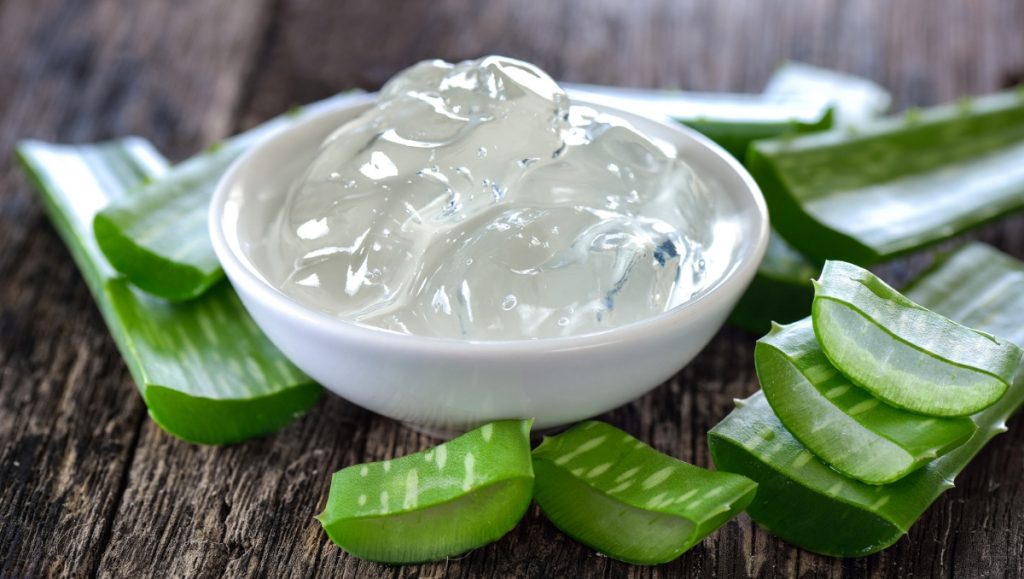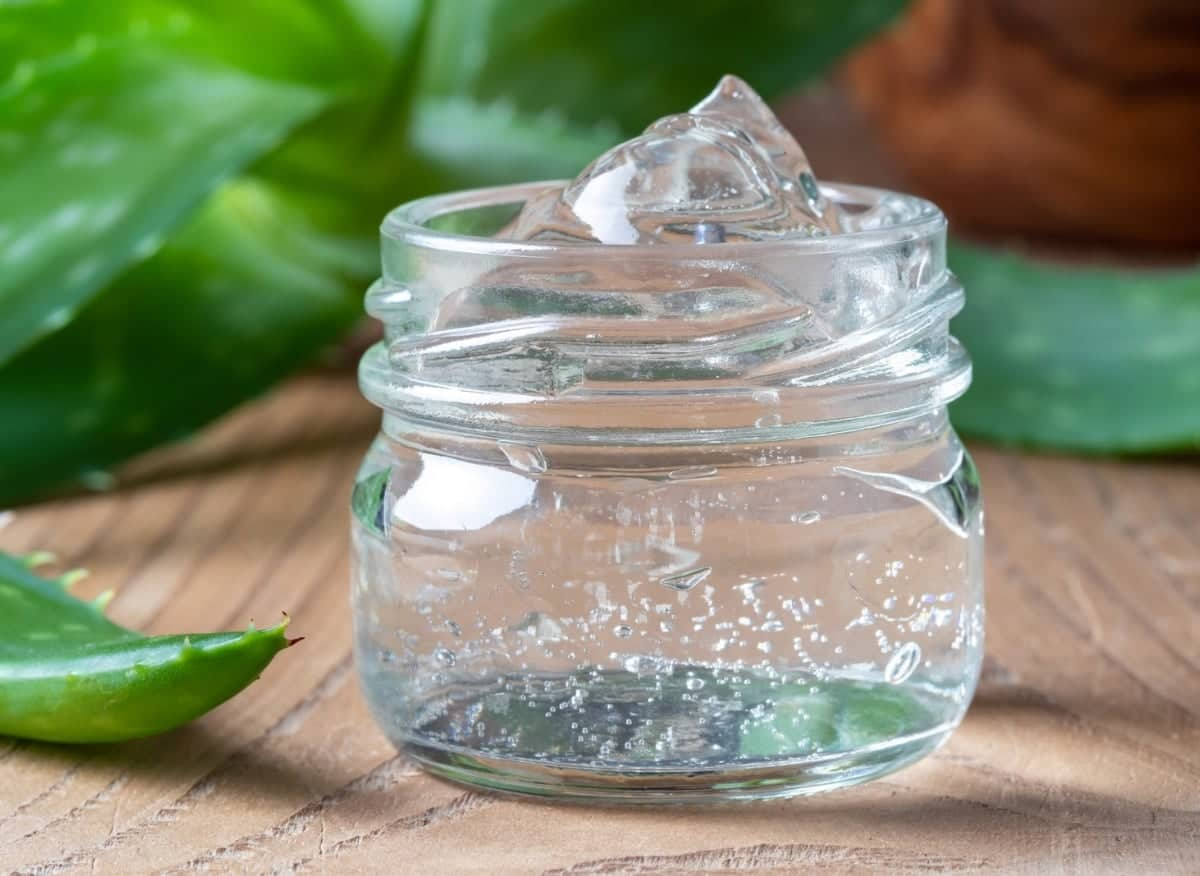This post contains affiliate links. See the affiliate disclaimer here.
You may be surprised to learn that aloe vera gel does indeed have an expiration date. While aloe vera itself is often referred to as the “plant of immortality,” the gel derived from it is not immortal.
Just like other organic substances or plant products, aloe vera gel can spoil when exposed to air. However, it’s important to note that the shelf life of aloe vera gel can vary depending on various factors.
So, if you’re curious about how long your store-bought aloe vera gel will last, whether it’s safe to use expired gel, or how to properly store it to maximize its shelf life, keep reading! We’ll provide you with all the details you need to ensure that your aloe vera gel stays fresh and effective for as long as possible.
Aloe vera gel is made from the pulp of the aloe vera plant. This gel-like substance contains a number of beneficial compounds, including vitamins, minerals, and amino acids. Aloe vera gel is thought to have anti-inflammatory, healing, and soothing properties.

Does Aloe Vera Gel Expire?
Aloe vera gel is renowned for its soothing and healing properties, making it a popular choice for skincare and haircare products. But like any organic substance, aloe vera gel does have an expiration date. So, how long does aloe vera gel last, and what signs indicate that it has expired?
The shelf life of aloe vera gel can vary depending on various factors such as storage conditions and the presence of preservatives. Unopened store-bought aloe vera gel generally lasts 12-18 months past the printed expiration date when refrigerated and 6-12 months when stored at room temperature away from heat and light. Refrigeration is ideal for maintaining freshness and preventing oxidation.
Though aloe vera gel can technically expire, it is important to note that it doesn’t become toxic or harmful when it reaches its expiration date. However, using expired gel may not provide the same effectiveness or benefits as fresh gel. It’s always recommended to use fresh aloe vera gel for optimal results.
To determine if your aloe vera gel has expired, here are some common signs to look out for:
- Change in color or texture: If the gel starts to change color, becomes slimy, or separates, it may indicate that it has spoiled.
- Rancid smell: A strong, unpleasant odor is another indicator that the gel has gone bad.
- Mold growth: If you notice any molds or mildew forming on the gel, it’s a clear sign of spoilage.
- Loss of consistency and liquidity: Expired gel may lose its original consistency and become clumpy or watery.
- Reduced effectiveness on skin: If the gel no longer provides the same soothing or healing effects on your skin, it might be time to discard it.
If you want to extend the shelf life of your aloe vera gel, you can try freezing it in an airtight container or freezer bag. Freezing helps prevent oxidation of active ingredients like enzymes, preserving the gel’s effectiveness for a longer time.
You can also add a preservative such as vitamin E or rosemary essential oil. You can also keep aloe vera gel in the refrigerator, which will help it last for up to one year.
Remember, it’s important to check the expiration date and signs of spoilage before using aloe vera gel. Using fresh gel ensures that you can enjoy all the benefits and soothing properties it has to offer. So, be mindful of the shelf life of your aloe vera gel and make the most out of this natural skincare ingredient.
If you’re not sure how long your aloe vera gel has been stored, it’s always best to err on the side of caution and throw it out. When in doubt, toss it out! It’s better to be safe than sorry when it comes to using expired products on your skin.
Factors Affecting the Expiration of Aloe Vera Gel
Aloe vera gel can indeed expire over time, and its shelf life can be influenced by various factors. Understanding these factors is important to ensure that you can enjoy the maximum benefits of aloe vera gel before it loses its effectiveness. Let’s take a closer look at some of the key factors that affect the expiration of aloe vera gel:
1. Storage conditions: The way you store your aloe vera gel plays a crucial role in determining its shelf life. Heat, humidity, and exposure to light can accelerate the degradation of the gel. Therefore, it is essential to keep your aloe vera gel in a cool, dry place, away from direct sunlight. Refrigeration is highly recommended, as it can help extend the shelf life and preserve the potency of the gel.
2. Presence of preservatives: Some aloe vera gel products in the market come with added preservatives to extend their shelf life. These preservatives inhibit the growth of bacteria, fungi, and other microorganisms that can cause the gel to spoil. If you’re using a commercially prepared aloe vera gel, check the label to see if it contains preservatives. However, even with preservatives, the gel will eventually expire, so it’s important to check the expiration date.
3. Quality of the gel: The quality of the aloe vera gel used also affects its expiration. Higher-quality gel, obtained from fresh aloe vera leaves and processed under optimal conditions, tends to have a longer shelf life. It is a good practice to choose reputable brands that prioritize the quality and purity of their aloe vera gel products.
4. Exposure to air and contaminants: The exposure of aloe vera gel to air and contaminants can lead to its degradation and spoilage. When using the gel, always make sure to use clean hands or a sanitized spoon to avoid introducing bacteria into the container. Additionally, tightly seal the container after each use to minimize exposure to air.
By considering these factors and following proper storage and usage guidelines, you can ensure that your aloe vera gel remains fresh and effective for as long as possible. Regularly check the expiration date and any visible signs of spoilage, such as changes in color or texture, a rancid smell, or the presence of mold. Using fresh gel within its shelf life is vital to fully enjoy the healing and soothing properties of aloe vera.
Can You Use Expired Aloe Vera Gel?
Using expired aloe vera gel on sunburn may not be the best idea. While aloe vera gel has many beneficial properties for soothing and healing the skin, expired gel may have lost its effectiveness.
Over time, aloe vera gel can lose its potency due to factors such as exposure to air, temperature changes, and the breakdown of active ingredients. These factors can cause the gel to become less effective in providing relief for sunburn or other skin conditions.
Expired aloe vera gel may also be at risk of spoiling, which can lead to the growth of bacteria or mold. Using spoiled gel on your skin can potentially cause irritation or infection, which is the last thing you want when dealing with a sunburn.
To ensure the freshness and effectiveness of your aloe vera gel, it’s recommended to check the expiration date before use. Using a gel that is past its expiration date increases the risk of using a product that may no longer deliver the desired benefits.
If you’re unsure whether your aloe vera gel is still good to use, it’s better to err on the side of caution and discard it. It’s always best to use fresh gel within its shelf life to fully enjoy its healing and soothing properties.
But don’t worry! If you’re in need of relief from your sunburn, there are alternative treatments that can provide similar benefits. Natural remedies like cold compresses, oatmeal baths, or coconut oil can help soothe the skin and reduce inflammation.
Remember, when it comes to your skin’s health and comfort, it’s important to prioritize freshness and quality. So, if your aloe vera gel has expired, it’s time to invest in a new bottle and ensure you have the best product to provide the relief you need.
Proper Storage to Extend the Shelf Life
To ensure the longevity and effectiveness of your aloe vera gel, proper storage is key. By following these storage tips, you can extend the shelf life of your gel and maximize its benefits:
- Keep it refrigerated: Humidity and temperature have a significant impact on the freshness of aloe vera gel. Once you cut off a leaf, the gel starts to decompose due to natural enzymatic reactions and bacteria on the plant. Refrigeration can help slow down this process and keep the gel fresh for about five to seven days.
- Store it in a cool place: If refrigeration is not an option, make sure to store your aloe vera gel in a cool place. Exposure to high temperatures can accelerate the breakdown of active compounds, reducing the gel’s effectiveness. Avoid storing it near heat sources or in direct sunlight.
- Keep it tightly sealed: To prevent air exposure, always ensure that the container or bottle of your aloe vera gel is tightly sealed. Oxidation can occur when the gel comes into contact with air, leading to a loss of potency and effectiveness.
- Check the expiration date: While refrigeration and proper storage can help prolong the shelf life of your aloe vera gel, it’s important to regularly check the expiration date. Expired gel may not only lose its potency but could also be a breeding ground for bacteria or mold, posing potential risks to your skin.
By following these storage practices, you can prolong the freshness and efficacy of your aloe vera gel and continue to enjoy its soothing and healing properties. Remember to prioritize freshness and quality for the health and comfort of your skin.
Conclusion
Taking proper care of your aloe vera gel is essential to ensure its effectiveness and safety for your skin. As discussed in this article, using expired aloe vera gel can pose potential risks and may not provide the desired soothing and healing properties, especially for sunburn relief.
To extend the shelf life of your aloe vera gel, it is crucial to store it correctly. Refrigerating the gel, keeping it in a cool place, and tightly sealing the container are all effective ways to maintain its freshness. Additionally, regularly checking the expiration date is important to ensure that you are using the gel within its recommended timeframe.
By following these simple storage practices, you can maximize the benefits of your aloe vera gel and ensure that it remains a reliable option for your skincare routine. Remember, fresh and properly stored aloe vera gel is the key to experiencing its natural healing properties and keeping your skin healthy and nourished.

